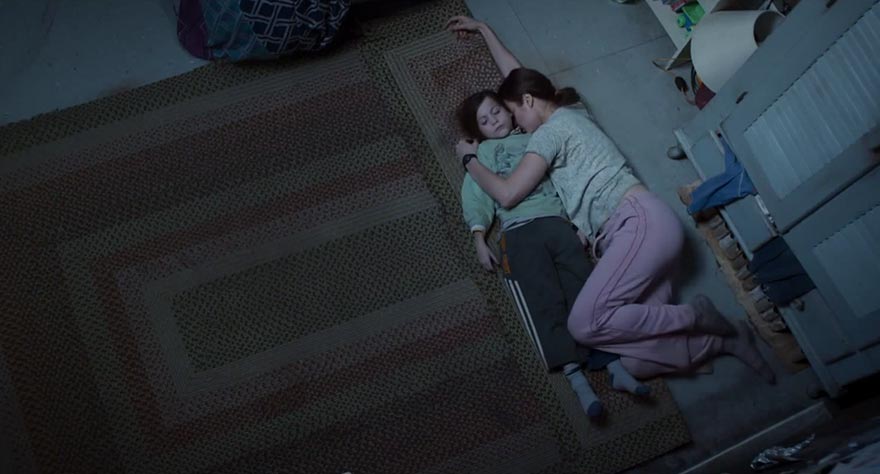
Perfect performances and an excellently adapted script create a visceral emotional experience.


Perfect performances and an excellently adapted script create a visceral emotional experience.

Split almost perfectly down its center, Lenny Abrahamson‘s Room, based on the bestselling novel by Emma Donoghue, is equal parts heart-stopping thriller and emotionally visceral drama. Few films are as effectively stomach-churning while sustaining emotional connectedness in so compelling a manner. This is what is possible when a novel is perfectly translated to screen and, like Gillian Flynn’s Gone Girl screenplay adaptation last year, holds up a keen argument for authors adapting their own work. A far cry from Abrahamson’s decidedly weirder film entry of last year, Frank, Room is an insular (literally) account of a young woman, Ma (Brie Larson, being amazing), doing her best to raise her five-year-old son Jack (Jacob Tremblay, almost stealing the show) in the tiny one-room shack where they are held captive. Pushed to her breaking point and fearing for her son’s safety, Ma is finally driven to enact a harrowing plan to help her son escape and experience the world outside of “room.”
Abrahamson spends the film’s first act focused on the intricacies of life in a tiny room and the inventive and loving ways Ma has devised to keep her son healthy and happy. She cooks him meals on a hot plate, breastfeeds him for added sustenance, and leads him through yoga and running exercises around the room. Through expert use of Jack’s first person narrative scattered throughout the film, we see “room” through his five-year-old eyes. The toilet, the chairs, the television and the wardrobe he often sleeps in all take on distinct and special characteristics as they make up the entirety of Jack’s universe and everything he’s ever known. But most important of all is Ma, and the bond between mother and son is strong and almost feral.
In watching their lives it becomes clear that in the seven years Ma has spent in “room,” and the five that Jack has, a routine has developed. Each night Ma tucks Jack away into the wardrobe, doing her best to shelter him from her captor, Old Nick (Sean Bridgers), when he makes his nightly visit to Ma to take advantage of her. Jack knows the drill, but curiosity gets the better of him one night and he climbs out to have a look at the only other human being he’s ever seen. Ma awakes to find Nick talking to Jack and reacts with a fierce protectiveness. She pays the price and decides once and for all something must be done.
The plan for escape in the film is equal in anxiety to any great heist film, more so because it’s experienced mostly through Jack’s scared understanding of what he is doing. The entire plan rests on him to act, but more than that it relies on him accepting this new truth his mother is revealing to him that there is an entire universe outside of “room” and he needs to choose to leave everything he knows and loves, including his mother. There isn’t an audience alive that won’t be gripping their armrests as the escape scene plays out, and without revealing too much about how the film continues, suffice it to say that Ma and Jack face an entirely new set of demons once they are out in the real world.
The intimate nature of the narrative is what especially allows for the emotional connection one feels for Ma and Jack. They represent the fear everyone shares at being violated so profoundly by another human. One can’t help but imagine what they would attempt or feel in a similar situation. How can anyone prepare for such a thing? Equally so, how can we predict the physical and emotional effects and how they will manifest in the years following such trauma? Jack shows us the resilient nature of children in the way he begins to accept the new world he is experiencing, while Ma is haunted by the world she knew before her kidnapping and how it can never be the same. And both have to get used to a world full of judgment and expectation and an inability to truly understand their experience.
Obviously the film’s writing is what sets it up for success, but Larson and Tremblay’s performances are what elevate this film to perfection and sure-fire award candidacy. Larson manages to juggle portraying an abused woman, a fierce mother, and a PTSD-afflicted young woman who wasn’t allowed to complete her own childhood. Tremblay, and his perfect little lips, expresses the entire range of a five-year-old: wonder, excitement, stubbornness, fear, and child-like unadulterated love. His courage is astounding and the chemistry between Larson and himself is palpable.
There are a few unexplored story threads in the second half that leave us wanting, most especially between Ma and her father played by William H. Macy. And, of course, it’s difficult for there to be a truly satisfying stopping point to the film, as one becomes so attached and invested in the characters it’s natural to wish we could see how their entire lives play out. The film’s lens stays close on its subjects, contributing to the claustrophobic but intimate relationship of its lead characters. The cinematography is a wash of blue and green but manages not to be depressing with its drab scheme.
Room is certainly among the year’s essential viewing and while some may be quick to label it a “difficult watch,” such a description neglects the ultimately life-affirming and passionately affecting story told. Abrahamson has done an amazing job in inviting viewers to consider one of those potentialities no one likes to think about, engaging us with a deeply personal and fantastically told tale of survival and familial bond.